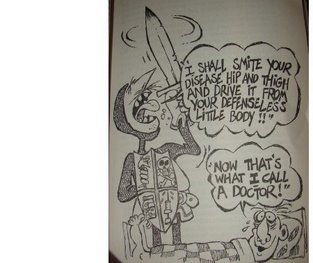Wheezy kids prior to diagnosis of asthma!!!!!!
Murray, C.S., et al, Lancet 368:754, August 26, 2006
METHODS: This double-blind, controlled British study, sponsored by GlaxoSmithKline, examined the effect of early initiation of inhaled fluticasone in 200 young children who were randomized to active or placebo treatment after two confirmed episodes of wheezing or one prolonged (more than one month) episode. Fluticasone was initiated at a dose of 100mcg twice daily; the dose was reduced every three months to the minimum required to control symptoms. The patient age at the time of randomization was 0.5-4.9 years (median, 1.2 years) and follow-up was continued until the age of five, when information was available for 173 children.
RESULTS: Upon completion of follow- up, there were no statistically significant differences between the groups in the percentage of children with wheezing in the prior twelve months or the percentage with physician-diagnosed asthma. There were no differences in the use of asthma medications, measures of lung function or airway reactivity. The active treatment group had lower median daily symptom scores and fewer unscheduled physician visits for wheezing during the third month of the study, but not during the first two months. Open-label treatment with inhaled fluticasone was permitted in children whose symptoms were not controlled after three months, and there were no significant differences between the two study groups in the percentage of children ultimately treated with open-label fluticasone.
CONCLUSIONS: Early introduction of maintenance inhaled fluticasone in preschool children with wheezing was not associated with a significant reduction in the progression to asthma or improvement in lung function by age five years. 31


No comments:
Post a Comment